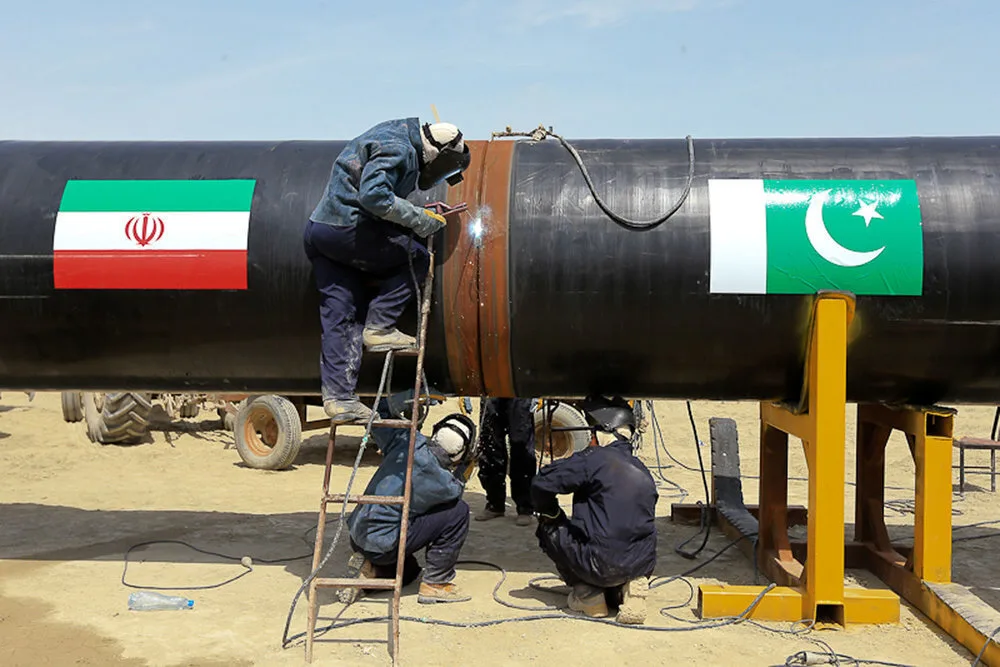
The construction of the Iran-Pakistan gas pipeline, touted by experts as a boon for Pakistan’s energy security, faces potential hurdles arising from United States sanctions. The US State Department has explicitly conveyed its disapproval of the project, cautioning Pakistan of the risk of incurring sanctions if it proceeds with construction. This development underscores the complex interplay between regional energy needs and the broader geopolitical landscape.
“It may be dangerous to be America’s enemy, but to be America’s friend is fatal”,
Late former US Secretary of State Henry Kissinger once remarked – and the US has proven him right. Time and again, it has shown that it is not a reliable ally in global affairs.
This week, Pakistan’s Petroleum Minister, Musadik Malik, articulated the nation’s pursuit of a U.S. sanctions waiver for the gas pipeline originating from Iran. This initiative parallels waivers granted to India for trade with Russia and Iran, despite ongoing American sanctions. Concurrently, certain Pakistani political figures have leveled accusations against Washington, alleging interference in the country’s domestic political affairs—a contention which the U.S. government refutes.
The Pakistan-Iran gas pipeline project, often referred to as the “Peace Pipeline,” exemplifies the complexities inherent in international energy partnerships. Despite being considered a US ally; Pakistan faces significant challenges in realizing this long-term project with Iran. The pipeline, envisioned to transport natural gas from Iran to Pakistan, has been plagued by delays and funding constraints for several years.
While Iran has demonstrably completed its portion of the project with a constructed 900 km pipeline, progress on the Pakistani side remains stalled. However, a recent announcement in February 2024 suggests a potential shift, with the Pakistani government indicating the commencement of construction on an 80-kilometer segment linking the Iranian border to Gwadar, Pakistan.
Beyond addressing Pakistan’s immediate energy needs, the Iran-Pakistan gas pipeline project is anticipated to serve as a catalyst for economic activity, particularly within Balochistan province. The influx of natural gas is expected to bolster investor confidence in local industries, potentially leading to regional economic development. Furthermore, the project’s geographical proximity and the shared border with Iran present a financially viable option for gas transportation.
The project also presents significant economic benefits for Iran. The steady flow of natural gas exports through the pipeline would generate a dependable revenue stream for the Iranian economy. Additionally, the project could foster stronger diplomatic ties between Iran and Pakistan, potentially extending to other regional nations. Notably, the pipeline’s completion would enhance Iran’s strategic influence within the region, enabling it to leverage its vast natural gas reserves, the world’s second largest after Russia.
Despite the demonstrably mutual benefits associated with the pipeline project, its progress has been hampered by numerous obstacles, primarily stemming from U.S. intervention. The long-standing strained relations between the United States and Iran, coupled with U.S.-imposed sanctions on Iran, have significantly deterred Pakistan’s pursuit of pipeline construction. Notwithstanding these challenges, Iran, having already invested millions of dollars towards the project’s development since 2014, has recently extended the deadline for its completion by 180 days, pushing it to September 2024. This extension underscores Iran’s continued commitment to the project’s realization.
Pakistan’s recent pursuit of a waiver from US sanctions on the Iran-Pakistan gas pipeline project underscores the precarious situation the country faces. Islamabad seeks to secure Iranian gas supplies while avoiding punitive measures from the United States. This pursuit is complicated by the potential for significant financial penalties from Iran if Pakistan reneges on its contractual obligations. The prospect of such penalties adds to Pakistan’s already fragile economic state.
The rationale behind US opposition to the project remains a point of contention. Pakistani commentators highlight the seemingly contradictory nature of US policy, given the waiver granted to India for its purchase of the Russian S-400 missile defense system. This inconsistency fuels speculation regarding the true motivations behind US opposition.
Despite the uncertainties, Pakistan has taken preliminary steps to advance the project. The recent announcement by the caretaker government regarding the construction of a domestic segment of the pipeline serves as a potential hedge against future legal disputes with Iran.
In light of Pakistan’s economic vulnerability and its critical need for natural gas, it is recommended that the United States consider granting a waiver from sanctions similar to the one extended to India. Alternatively, the US could explore avenues to compensate Pakistan for any economic losses incurred due to the sanctions. The enduring costs borne by the Pakistani people in maintaining their alliance with the US necessitate a reevaluation of current policies. The American administration must acknowledge the unique challenges faced by Pakistan and recognize the vital role the Iran-Pakistan gas pipeline project plays in fulfilling the energy needs of the Pakistani population.
